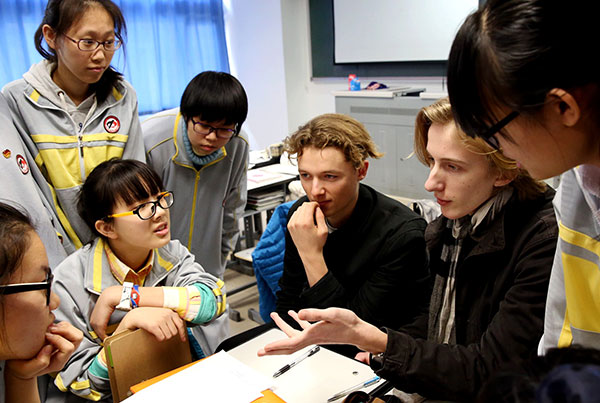
Middle school students from Denmark in discussion with Chinese students at an English class at Beijing No 2 Middle School in March. In September, the State Council, China's Cabinet, released details of proposed reforms to the gaokao that will underline the importance of English in the exam.(Photo/Xinhua)
Proposed changes to China's famously grueling university entrance exam will focus on improving the standards and methods of language tuition in the nation's schools.
The most popular weekly publication in China isn't produced in Beijing or Shanghai, but in Taiyuan, the capital of Shanxi, a province better known for coal mining than literary endeavor.
Nevertheless, with a circulation of 16 million, English Weekly is shaping the English skills of Chinese students like no other book or newspaper-its editions aimed at senior high school students garner more than 8 million readers a week, accounting for one-third of all children in China's senior high schools.
According to English Weekly's editors, one of the reasons the paper is so popular is that the exercises it provides are based on its long experience of the gaokao, the national college entrance exam, and that can help give students the edge in the life-changing test.
A recent edition aimed at grade-one senior high school students is a good example of the paper's output: Five of the eight pages contain tests, two focus on after-school reading, and the other features review lists of useful words and expressions. Some of the material is based on the textbooks the children use at school, but some comes from left field.
"We always want to include more extracurricular material that will broaden the students' horizons and introduce more of the culture of the English-speaking world. But I'm afraid the teachers won't be happy, because their priority is to prepare the students for the gaokao," Cao Yu, editor-in-chief of the senior high school edition, said.
Sun Xing, who is also an editor on the edition, said with a smile: "Sometimes, my younger brothers and sisters tell me their classmates joke that I'm the one who gives them so many tests. They are tired of doing so many exercises, but they have no choice if they want to take the gaokao."
Now, though, English Weekly's editors are preparing for changes.
In September, the State Council, China's Cabinet, released details of proposed reforms to the gaokao that will underline the importance of English in the exam. Students will also be allowed two bites at the cherry because they will be allowed to take the English test twice if they choose to do so-in January and June-and will be permitted to use the higher of the two scores as their gaokao English test result. The proposals also suggested long-term, ongoing assessment of students' English language skills to indicate the full range of their ability.
The proposals will be tested in two areas, Shanghai and Zhejiang province, but the reforms won't be expanded across the country until 2017. As yet, details of specific reforms in each province are unknown, but the English exam is widely expected to place greater emphasis on communication skills, a striking departure from the old days when-according to experts-too much attention was paid to grammar.
The 2014 English Proficiency Index, compiled by Education First, a global English-language education company, estimated that the market for English teaching in China is worth about $7.5 billion a year. The index classified proficiency in English among Chinese people as "low", and China was ranked 37th out of the 64 countries in the list where English is not the mother tongue. By contrast, South Korea was ranked 24th, while Japan was 26th.
















































